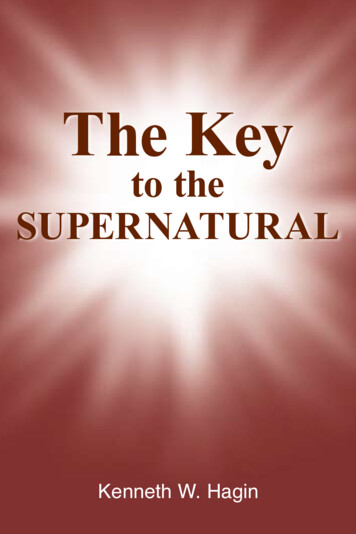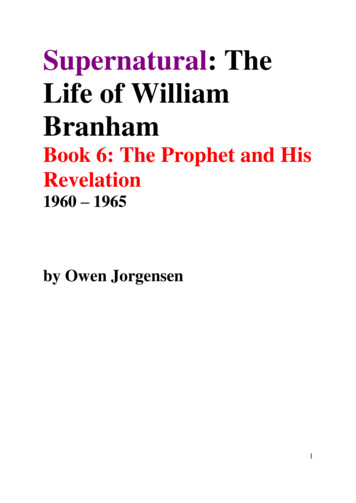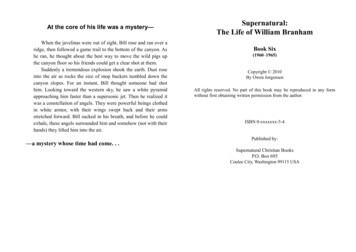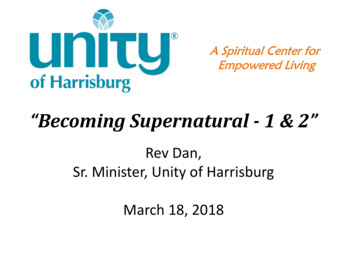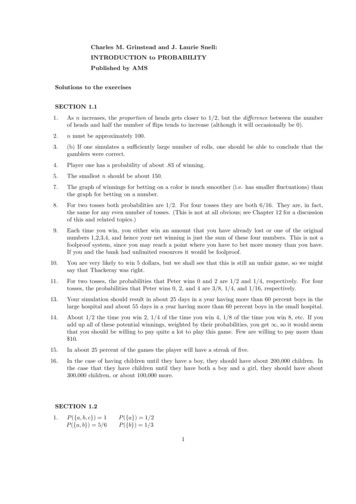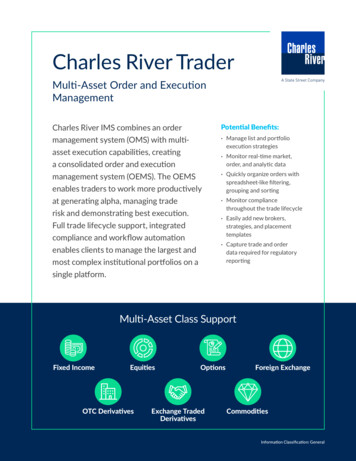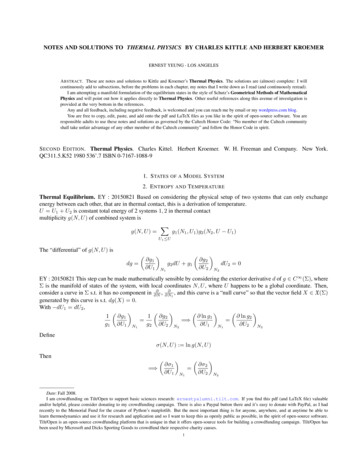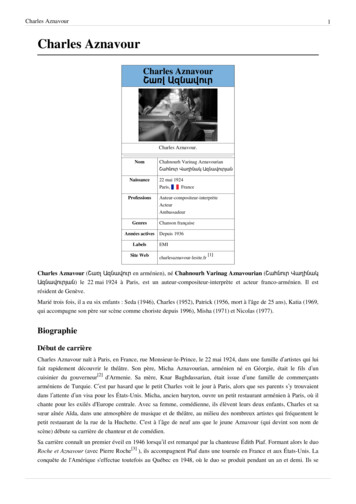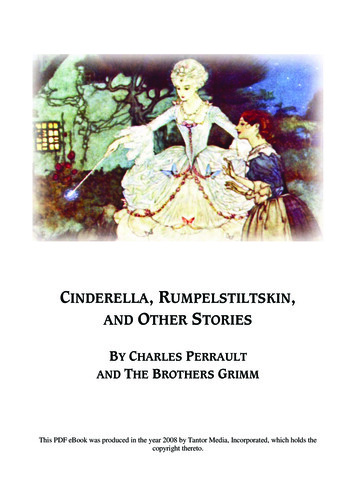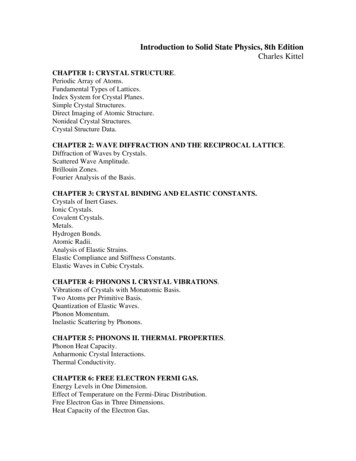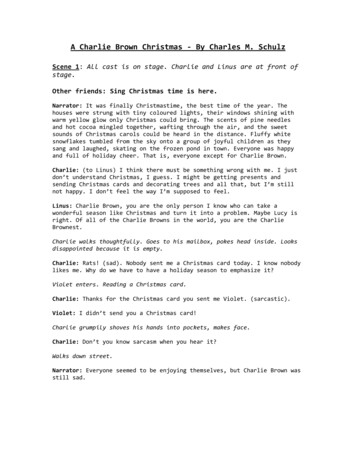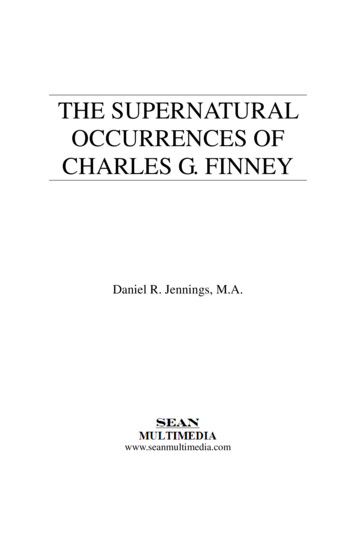
Transcription
THE SUPERNATURALOCCURRENCES OFCHARLES G. FINNEYDaniel R. Jennings, M.A.www.seanmultimedia.com
The Supernatural Occurrences Of Charles G. FinneyCopyright 2009 by Daniel R. JenningsAll rights reserved.No part of this work may be reproduced or transmitted in any form or byany means, electronic or mechanical, including photocopying andrecording, or by any information storage or retrieval system, except asmay be expressly permitted by the 1976 Copyright Act or in writing fromthe author. However, the author is a Christian and as such knows that allthings ultimately belong to God. Therefore he is very open to workingwith individuals or groups to see their goals reached. Requests forpermission should be addressed to the author through the publishingcompany. Permission is granted in advance to make copies for personal,study group, and classroom use.ISBN 978-0-557-09946-7Jennings, Daniel, R. 1977The Supernatural Occurrences Of Charles G. Finney.Scripture quotations, unless otherwise indicated, are from the King JamesVersion, either modernized by the author or in their original form.
TABLE OF CONTENTS1. Charles G. Finney: A Biographical Sketch12. Revelations From The Holy Spirit A Supernatural Revelation Leads To Finney’s Salvation TheHoly Spirit Reveals A Coming Revival A Revelation Of TheSpirit Teaches Finney How To Lead A Man To Christ ARevelation Of What Life In Heaven Is Like3. Visions A Vision Of Jesus A Vision Of The Light Of God’s Glory AVision Encourages Finney To Keep On Ministering4. The Gift Of Prophecy Brother Nash’s Prophecy A Prophecy Foretells A Woman’sHealing And Conversion The Gift Of Prophecy Leads ToConviction Finney Appears To Prophetically Foretell AnAnimal’s Strange Behavior A Woman Prophesies TheComing Revival A Prophecy Of A Coming Revival ToRochester, New York5. Slain In The Spirit Charles Finney’s “Slain In The Spirit” Compared WithClaimed Modern Accounts Examples Of Slain In The Spirit Charles Finney’s Understanding Of The Slain In The SpiritPhenomena6. Sinners Struck Dead An Opponent Of The Revival Is Struck Dead A Man WhoRidicules and Resists The Revival Dies Suddenly A MinisterWho Opposes The Revival Dies A Former Minister WhoResisted The Revival Is Struck Dead A Sinner Puts OffRepenting And Then Dies A Lukewarm Minister DiesDuring The Revival7. Miracles And Unusual OccurrencesA Woman Loses The Power Of Speech Until She Is Saved
Divine Manifestations From God A Woman Sees Hell AsShe Dies A Woman Supernaturally Learns To Read AfterPrayer The Presence Of God Is So Strong That It Can BeFelt Insanity Healed Prayer That Moves Reality PrayerBrings A Snowstorm That Deters Opponents Of The Revival Amazing Prayer A Woman Lives By Faith And ExperiencesGod’s Miraculous Provision Relying On The Holy Spirit ToGive Him Sermons A Bedridden Christian Prays ForRevival Until He Dies And Receives An Answer After Death An Agonizing Time Of Prayer Leads To A Banker’sConversion8. Tears Of Repentance 9. Examples Of Conviction References To Conviction Conviction So Great That AFactory Shuts Down To Seek God OverwhelmingConviction Conviction So Great That People Have To BeHelped Home Conviction That Leads To Restitution Conviction Prevents A Murder Vanity Is Overcome ByConviction10. Finney’s Experience With The Baptism OfThe Holy Ghost 11. Did Charles Finney Promote Emotionalism? 12. Why Was Finney So Successful As AnEvangelist? 13. Conclusion
Chapter 1Charles G. Finney: ABiographical SketchCharlesGrandisonFinney(1792-1875) was a lawyer who, afterconverting to Christianity, became oneof the foremost American ministers ofhis day. His ministry efforts played acentral part in a widespread 19thcenturyrevivalofAmericanChristianity and his theologicalCharles G. Finneyemphases and innovations in churchpractice influenced not only his own time but havecontinued to influence American Christianity up until the21st century. Theologically these facets include the beliefthat Jesus died for all men, that infants who die will go toHeaven, that mankind is endowed with free will and that allmen are capable of either choosing or rejecting Christimmediately at any time. On the practical side innovationssuch as protracted “revival” meetings, altar calls, the use ofmusic during appeals to persons encouraging them to makedecisions for Christ and the use of sermon outlines asopposed to writing out and reading the entire sermon alsoowe their acceptance in modern day American Christianityto Finney. To conservatives Finney stands as an evangelicalgiant who was one of the leaders in a revival during which50,000 persons a week were getting saved. To liberalsFinney is regarded as a forerunner of the modern socialgospel movement because of his tireless efforts in working1
to end American slavery. His writings had a profoundinfluence on a young William Booth who would go on tofound the Salvation Army and D. L. Moody encouraged theworld to “Look at the praying Finney, whose prayers, faith,sermons and writings, have shaken this whole country”.1Charles Spurgeon, though disagreeing with himtheologically, thought highly enough of Finney to quotehim as an authority on evangelism2 and when an artistnamed Jack Chick was given a book of his articles entitledPower From On High he was inspired to create the ChickTracts witnessing booklets. Nearly 70 years after his deathV. Raymond Edman, president of Wheaton College,referred to Finney as “the most widely known and mostsuccessful American evangelist.”3 His book Finney LivesOn carried with it an endorsement by Billy Graham. In1960 Harvard University Press, demonstrating the impactthat Finney’s revival measures had had upon Americanculture, released a critical edition of his Revival Lectures.Jerry Falwell referred to him as “one of my greatestheroes”4 and today, some 135 years after his death themajority of his books are still in print.51Moody, D. L. Prevailing Prayer: What Hinders It? (Chicago: F. H.Revell, 1884), Ch. 1, p.14-152Spurgeon, Charles. The Soul-Winner, or How To Lead Sinners To TheSaviour (London: Passmore & Alabaster, 1903), Ch. 4: Sermons LikelyTo Win Souls3Edman, V. Raymond. Finney Lives On: The Man, His Revival Methods,And His Message (New York: Fleming H. Revell, 1951), p.154Jerry Falwell, interview in The Horse’s Mouth (September, 1994)published by Christians United for Reformation (CURE), in Anaheim,California.5Through companies such as Zondervan and Whitaker but most notablythrough Truth In Heart Publishing who are also working on completion of2
In evaluating an individual of this stature certainquestions come to the forefront. Finney’s impact upon thechurch of Christ is undeniable and similar in nature to therevival of interest in Christianity that occurred in the bookof Acts: Were there any similarities between the way thatGod called New Testament persons such as the ApostlePaul and Finney? Were the responses of the people toFinney’s messages comparable in any way to the responseof the people to the preaching of the first Christianministers? Were the unusual experiences mentionedfrequently in the book of Acts similar in any respect to theunusual experiences mentioned frequently by Finney? DoesGod deal with Christian leaders today in the same way thatHe dealt with the first century Christian leaders? Andfinally, could studying Finney’s life help to give us a moreunderstandable picture of what those who ministered in thefirst century experienced on an emotional, physical andspiritual level?The quotes used in this investigation, unlessotherwise indicated, are from Finney’s Memoirs6 and areincluded to show similarities between his experiences andthose of Christians living in the first century church.the 20 volume The Life and Works of Charles G. Finney which isscheduled to include items never before published.6First published by Fleming H. Revell Company in 1876 under the titleMemoirs Of Rev. Charles G. Finney it has also appeared with the titles AnAutobiography (Salvation Army Book Department, 1880) and Charles G.Finney: An Autobiography (Hodder and Stoughton, 1882).3
Chapter 2Revelations From The Holy SpiritThroughout his Memoirs Finney mentions havingexperienced revelations from the Lord. These revelationswere the supernatural revealing of a certain truth to Finney,in some cases regarding his own spiritual condition. BothJesus and Paul speak of God the Father revealing things tomen supernaturally.7 After studying the life of Finney oneis led to ask, in what way(s) did his revelations compare ordiffer from the revelations of the Spirit mentioned by bothJesus and Paul.A Supernatural RevelationLeads To Finney’s SalvationTuesday night I had become very nervous; and inthe night a strange feeling came over me as if I was aboutto die. I knew that if I did I should sink down to hell; but Iquieted myself as best I could until morning. At an earlyhour I started for the office. But just before I arrived at theoffice, something seemed to confront me with questionslike these: indeed, it seemed as if the inquiry was withinmyself, as if an inward voice said to me, “What are youwaiting for? Did you not promise to give your heart toGod? And what are you trying to do? Are youendeavoring to work out a righteousness of your own?”Just at this point the whole question of Gospelsalvation opened to my mind in a manner most marvelousto me at the time. I think I then saw, as clearly as I everhave in my life, the reality and fullness of the atonement7Matthew 16:17; Galatians 1:11-12; 2Corinthians 12:14
of Christ. I saw that his work was a finished work; and thatinstead of having, or needing, any righteousness of myown to recommend me to God, I had to submit myself tothe righteousness of God through Christ. Gospel salvationseemed to me to be an offer of something to be accepted;and that it was full and complete; and that all that wasnecessary on my part, was to get my own consent to giveup my sins, and accept Christ.8 Salvation, it seemed tome, instead of being a thing to be wrought out, by my ownworks, was a thing to be found entirely in the Lord JesusChrist, who presented himself before me as my God andmy Savior.9Without being distinctly aware of it, I had stopped inthe street right where the inward voice seemed to arrestme. How long I remained in that position I cannot say. Butafter this distinct revelation had stood for some little timebefore my mind, the question seemed to be put, “Will youaccept it now, today?” I replied, “Yes; I will accept it today,or I will die in the attempt.”North of the village, and over a hill, lay a piece ofwoods, in which I was in the almost daily habit of walking,more or less, when it was pleasant weather instead of8This revelation is interesting because it went against the grain of whatFinney had been taught as a Presbyterian. As a Presbyterian he had beentaught to believe in predestination and that no person could choose of their“own consent” to give up their sins and “accept” Christ. They had to waitand see if he chose them as one of the predestined who were elect tosalvation. This radical new way of understanding salvation, which differedgreatly from the indoctrination that Finney had received, gives credence tothis being a genuine revelation from the Spirit.9Jesus talks about God the Father revealing supernaturally to Simon Peterthat Jesus was “the Christ, the Son of the living God” (Mat 16:17). Paultestifies that the gospel which he preached was “received by therevelation of Jesus Christ” (Gal 1:11-12). In what ways, if any, didFinney’s revelation of salvation through Jesus Christ differ from Peter andPaul’s?5
going to the office, I turned and bent my course towardthe woods, feeling that I must be alone, and away from allhuman eyes and ears, so that I could pour out my prayerto God. But still my pride must show itself. As I went overthe hill, it occurred to me that someone might see me andsuppose that I was going away to pray. Yet probablythere was not a person on earth that would havesuspected such a thing, had he seen me going. But sogreat was my pride, and so much was I possessed withthe fear of man, that I recollect that I skulked along underthe fence, till I got so far out of sight that no one from thevillage could see me. I then penetrated into the woods, Ishould think, a quarter of a mile, went over on the otherside of the hill, and found a place where some large treeshad fallen across each other, leaving an open placebetween. There I saw I could make a kind of closet. Icrept into this place and knelt down for prayer. As I turnedto go up into the woods, I recollect to have said, “I willgive my heart to God, or I never will come down fromthere.” But when I attempted to pray I found that my heartwould not pray. I had supposed that if I could only bewhere I could speak aloud, without being overheard, Icould pray freely. But lo! when I came to try, I was dumb;that is, I had nothing to say to God; or at least I could saybut a few words, and those without heart. In attempting topray I would hear a rustling in the leaves, as I thought,and would stop and look up to see if somebody were notcoming. This I did several times.Finally I found myself verging fast to despair. I saidto myself, “I cannot pray. My heart is dead to God, andwill not pray.” I then reproached myself for havingpromised to give my heart to God before I left the woods.When I came to try, I found I could not give my heart to6
God. My inward soul hung back, and there was no goingout of my heart to God. I began to feel deeply that it wastoo late; that it must be that I was given up of God andwas past hope.The thought was pressing me of the rashness of mypromise, that I would give my heart to God that day or diein the attempt. It seemed to me as if that was bindingupon my soul; and yet I was going to break my vow. Agreat sinking and discouragement came over me, and Ifelt almost too weak to stand
A Supernatural Revelation Leads To Finney’s Salvation . majority of his books are still in print. 5 1 Moody, D. L. Prevailing Prayer: What Hinders It? (Chicago: F. H. Revell, 1884), Ch. 1, p.14-15 2 Spurgeon, Charles. The Soul-Winner, or How To Lead Sinners To The Saviour (London: Passmore & Alabaster, 1903), Ch. 4: Sermons Likely To Win Souls 3 Edman, V. Raymond. Finney Lives On: The File Size: 1MBPage Count: 142
